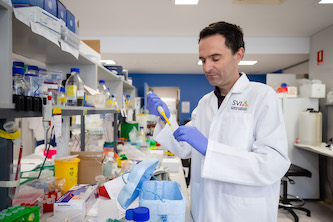Posted 15 March 2023

A multi-disciplinary team led by Associate Professor Andrew Deans has been awarded just under $1 million in funding for their cutting-edge gene editing research which aims to prevent children and young adults dying from bone marrow failure syndromes.
The goal of the research is to develop new treatments to correct disease-causing mutations in blood stem cells.
This pioneering new technology has the potential to transform the lives of people who require a blood stem cell transplant.
“By developing a more precise and programmable gene editing tool we can effectively lower the harm and cost associated with bone marrow transplant for people who carry mutations that affect their ability to produce blood cells,” A/Prof Deans said.
A/Prof Deans and his team are, essentially, aiming to repair the underlying changes in a person’s DNA that cause inherited bone marrow failure syndromes like Fanconi anaemia.
This rare genetic disease affects every organ in the body and the only current treatment is a bone marrow transplant.
“Bone marrow transplants come with a high risk of complications and for people with diseases like Fanconi anaemia, are not particularly effective,” he said.
“This funding will allow us to correct the underlying mutation and give hope to those people, mainly children and adolescents, who are diagnosed with one of the many forms of inherited bone marrow failure syndromes each year.”